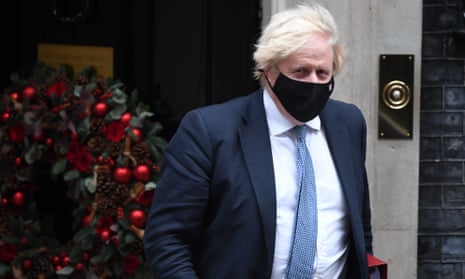Downing Street is facing a damaging revolt over planned Covid restrictions after dozens of Tory backbenchers threatened to rebel or abstain in fury over the proposed new rules and Boris Johnson’s handling of the Christmas party scandal.
With at least 30 Conservative MPs already expected to vote against regulations on masks, home working and vaccine passports, and many more now vowing to stay away from Tuesday’s vote, the prime minister could be left relying on Labour support to win.
“The whips will be doing a lot of work this weekend,” one Tory MP. “It’s all about saving the PM’s blushes.”
Johnson is battling the fallout from days of successive revelations about a festive gathering inside No 10 amid tough Covid rules last December. An inquiry into the reports has been expanded to examine other alleged events, including one that Johnson is believed to have attended.
In further blow for the prime minister, a Survation survey for the Daily Mirror put Labour six percentage points ahead of the Conservatives, at 40% to 34%. A YouGov poll for the Times had Labour four points ahead on 37% to 33%.
Announcing the hastily set up review on Wednesday following public outrage over a video showing Downing Street staff joking about the supposed party on 18 December last year, Johnson initially said it would look into only that event. Recent reports have said that Jack Doyle, the then deputy director of communications, gave out awards to staff during the evening and there was food, drinks and games. Doyle, now head of press for Downing Street, has been contacted for comment.
However, the Cabinet Office minister Michael Ellis, addressing MPs on Thursday, said the investigation led by the cabinet secretary, Simon Case, would also examine another Downing Street party on 27 November last year – reportedly a leaving event at which Johnson spoke – and one at the Department for Education on 10 December.
The terms of reference for the process, published later in the day, added: “Where there are credible allegations relating to other gatherings, these may be investigated.”
Ministers and officials would be “expected to cooperate” with the inquiry, it said. Case and his team will establish the need for any disciplinary action, or whether potential breaches of the law should be referred to the police.
Shortly after unveiling the review, Johnson announced he was introducing tougher “plan B” Covid restrictions for England because of the rapid spread of the Omicron variant – a move that some speculated was timed in part to distract attention from the parties, but which Tory MPs say has instead magnified their annoyance and frustration.
The likely collision point will be next Tuesday, when MPs will vote on the restrictions, covering an extension to mandatory mask-wearing, advice to work from home and, most controversially, the introduction of Covid status certificates as a condition of entry to venues such as nightclubs and football grounds.
A BBC tally said at least 22 Tory MPs had already said they would vote against the rules, with a dozen more expressing wariness. One backbencher said they also expected “a high number” of others deciding not to vote. “What that looks like exactly is unclear, but it is unlikely to be a good day for the government,” they warned.
Up to a quarter of parliamentary private secretaries, the junior rank of ministerial aides, are believed to be seeking official permission to miss the vote, allowing them to avoid backing the plan without having to resign, but whips are refusing.
“A lot of MPs seem to want to campaign in the North Shropshire byelection that day,” one backbencher said. A senior MP said they believed they had “already lost [their] seat” and thus felt “ungovernable”.
“The mood on the backbenches is really angry,” yet another backbencher said. “It’s going to be quite a sizeable rebellion. I think the government will only get this through with Labour votes. It’s a bit like the Theresa May Brexit days – which is somewhere I never really wanted to go back to.”
The sense of resentment combined both the shift in Covid rules and the furore over illicit Christmas parties, they said. “It’s us who get the angry emails saying about the Downing Street parties. We’re the ones who get it in the neck. So you’re much less willing to bail out the boss, particularly with unforced errors.
“People are much more forgiving if it’s a single issue. When us backbenchers have been marched up and down the hill one too many times, it’s not conducive for morale.”
The new Covid rules are being introduced over the next few days, with the extension of mandatory mask use to include such venues as theatres and cinemas starting from Friday. While that is before the Commons vote, the regulations can be changed immediately and approved by MPs retrospectively.
In an apparent attempt to help get Tory MPs onside, Downing Street insisted Johnson was not advocating possible mandatory vaccinations when he told a press conference on Wednesday that there might come a time to “have a conversation” about more ways to combat Covid.
Johnson was simply “making a broader point on the intention to keep developing further mitigations against coronavirus”, his spokesperson said.
